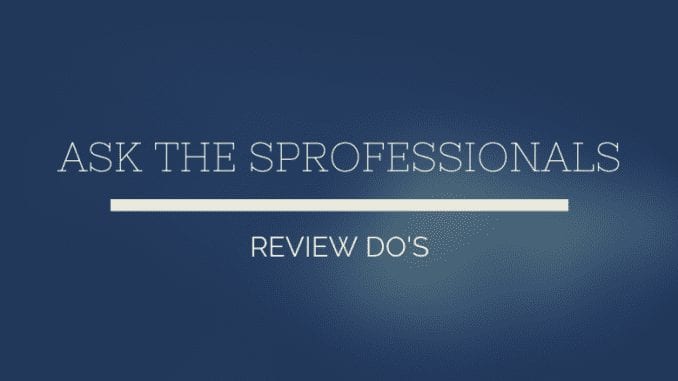
We wrap up this three-part series by learning how to effectively craft employee reviews and feedback.
BY RJ JOSEPH
SPECIAL TO BARISTA MAGAZINE ONLINE
Editor’s note: Some responses have been edited for brevity and clarity. View the first two parts of this series here and here.
Productive, constructive reviews and feedback are essential to the growth of any business. But how should a review system look? What proactive steps can managers take to construct a beneficial review system that increases engagement, trust, and retention in their organization? The Sprofessionals are here to help break down what attributes the best review systems share.
The Question: What types of systems have you found most beneficial for reviews? Can you tell me about the best review system you’ve experienced?
Liz Dean, eight years in coffee, area lead (Chicago, D.C., and Boston regions) for The Wing, former manager and barista
“The best review system that I’ve used to date—and it’s not totally perfect—but my company uses a program called Lattice. Most recently we used this not only to conduct both ‘downward’ and ‘upward’ reviews (i.e., manager to direct report and vice versa), but also peer reviews.
I like a six-month review cycle, but I’m a firm believer that any review cycle needs to be partnered with a regular cadence of communication and check-ins between managers and direct reports. In my current role, I have weekly one-on-ones with all of my direct reports. My goal is to ensure that part of those one-on-ones is dedicated to talking about development and working towards ‘S.M.A.R.T’ goals that we’ve outlined together. I think ultimately having regularity and consistency when it comes to communication about performance is key, even if review cycles are spaced further apart.”

Bethany Letoto, seven years in coffee, freelance writer, former barista and roaster
“The restaurant where I work has an amazing review system. Every six months each staff member will sit down with ownership and the manager(s) they work directly under. The first time we did reviews it was fairly informal, and I was presented with not much more than a pat on the back and a ‘that’s all.’ However, once we got around to reviews the second time, a system of self-reflection and evaluation had been established. In the weeks leading up to reviews, management passes out a sheet of paper with some questions—what do you think your strengths are, where do you see yourself having some room to grow, and—this is crucial—what do you think we (as a restaurant or a management team) could be doing better?
For me, this part of the review is both the hardest and most valuable.
While I have the page of questions that I’m filling out for self evaluation, management has the same questions that they’re considering for me, so when we have our sit-down meetings we basically just swap notes and discuss strategies for growth, both in the areas we were on the same page about and in the areas where we had differing perspectives.
In addition to the individual evaluations we do at the place where I work, we also have anonymous surveys that are handed out to the staff for each manager twice a year. The questions are different than the ones we use for self assessment—manager reviews have questions like ‘Does this manager help you grow?’ and ‘Does this manager make you feel that you’re being listened to and your concerns are valid?’ ‘Does this manager communicate in a way that you understand?’ For all of the above, we were asked to rate on a scale of 1-10, plus [fill out] a section at the bottom for any further thoughts or suggestions.
Anytime there’s a concrete, actionable item a manager can give to a staff member as a goal, that’s great.”

Hiu Yan (Sharon) Fung, barista and former café manager
“We do employee reviews every three months. Two weeks before the personal check-in day, the manager will hand out a paper that will ask you to write down:
1) At least three glows (things that you think you’ve done well)
2) At least three grows (things that you think you need to get better at)
3) Your goal for the next three months
The manager will fill out the same form for each individual employee, and each individual employee will fill out one for themselves. On the personal check-in day, the manager will ask the employee to talk about their glows, grows, and three-month goal. After that, the manager will share what they wrote down for the employee. This is a very effective and transparent way to communicate with staff. Often, we leave the room with excitement to strive to do better.
Peer reviews are also important, especially the anonymous ones. That is when your coworkers speak their true feelings about your work. I think 360 reviews are a wonderful idea as long as they’re transparent and fair.”
Jenn Chen, eight years in coffee, coffee marketer
“It’s my firm belief that nothing in a review should be a surprise. If there is, then it means that your ongoing communication has not been happening and/or the employee doesn’t feel comfortable talking to you. So the results should really just be benchmarking progress or lack thereof in the work. I also find it a good time to check in on their own career goals, to see if they’ve changed and/or if you can support them in any way.
When giving criticism, I find examples very helpful, as well as what can be done to improve results. It should never be only a one-way conversation from manager to report.”
The Takeaways:
- Having a system for regular reviews and evaluation is really important.
- Mutuality is important too! The best review systems allow the organization to improve, not just the employee.
- All feedback should be actionable, and bonus points if it’s concrete.
- Cadence can vary between companies, but the important things are consistency and open lines of communication.
Do you agree with the Sprofessionals? Let us know your thoughts via info@baristamagazine.com

ABOUT THE AUTHOR
RJ Joseph works at Red Fox Coffee Merchants as a cupper and content strategist. Following coffee from Pittsburgh to Oakland, Calif., she became a certified Q Grader and learned to roast, sling bags, and drive a forklift with the pros. Uniting her twin passions for coffee and writing, she launched a blog in 2016, then started freelancing, always maintaining a central focus on the ways in which coffee can make the world a more equitable place. She also runs a coffee satire site called The Knockbox. Outside of work, you’ll probably find her cooking, tending her many plants, listening to records, and walking around the city.

